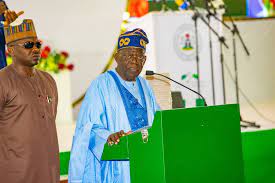…..
tasks CBN on unified FX rate
….to end fuel subsidy regime
…..targets 6% GDP growth rate
Nigeria’s new President, Bola Ahmed Tinubu, today, May 29th 2023, immediately after he took the Oath of Office as the 16th President of the Federal Republic of Nigeria at the Eagle Square, Abuja, outlined his governance plans, especially on the nation’s economy in terms of policy and other transformational thrusts.
According to him, the new administration will discontinue the fuel subsidy regime even as he vowed to review the recent Naira redesign policy by the Central Bank of Nigeria (CBN) with a view to improving the efficiency of the implementation.
Tinubu promised the citizenry of the readiness of his administration to protect Nigeria from all forms of terror as well lift millions of Nigerians out of the extreme poverty trap.
Specifically on the economy, the new President said that his administration would target a higher GDP growth and to significantly reduce unemployment through budgetary reforms that will stimulate the economy without engendering inflation and industrial policy that will utilize the full range of fiscal measures to promote domestic manufacturing and lessen import dependency.
He expatiated: “In economy, we wiIl target not less than 6 per cent growth in GDP growth. We will do this through budgetary reforms.
“We will use a full range of domestic manufacturing and lessen importation,” he added.
Also, Tinubu promised that electricity would become more accessible and affordable to businesses and homes alike. Power generation should nearly double and transmission and distribution networks improved. We will encourage states to develop local sources as well.
To boost investments in the economy, the President said: “I have a message for our investors, local and foreign: our government shall review all their complaints about multiple taxation and various anti-investment inhibitions.
“We shall ensure that investors and foreign businesses repatriate their hard earned dividends and profits home”, he added.
Similarly, he said that his administration must create meaningful opportunities for the youth and honour his party’s campaign promise of one million new jobs in the digital economy.
Tinubu expressed the readiness of the new administration to work with the National Assembly to fashion an omnibus Jobs and Prosperity bill, which will give the administration the policy space to embark on labour-intensive infrastructure improvements, encourage light industry and provide improved social services for the poor, elderly and vulnerable.
On plans by the new administration to boost agriculture, he said: “Rural incomes shall be secured by commodity exchange boards guaranteeing minimal prices for certain crops and animal products. A nationwide programme for storage and other facilities to reduce spoilage and waste will be undertaken.
“Agricultural hubs will be created throughout the nation to increase production and engage in value-added processing. The livestock sector will be introduced to best modern practices and steps taken to minimize the perennial conflict over land and water resources in this sector.
“Through these actions, food shall be made more abundant yet less costly. Farmers shall earn more while the average Nigerian pays less”, Tinubu pledged.
This is even as he restated the commitment of his administration to the initiatives of the Buhari administration on infrastructure by prioritizing investments in road, rail and port networks nationwide.
On the controversial fuel subsidy regime, Tinubu lauded the decision of the outgoing administration in phasing out the petrol subsidy regime which had increasingly favoured the rich more than the poor.
He stressed that “fuel subsidy can no longer justify its ever-increasing costs in the wake of drying resources. We shall instead re-channel the funds into better investment in public infrastructure, education, health care and jobs that will materially improve the lives of millions.”
In addition, the new President shared his thoughts on monetary policy measures and charged the Central Bank of Nigeria (CBN) to work towards a unified exchange rate in order to direct funds away from arbitrage into meaningful investment in the plant, equipment and jobs that power the real economy.
Tinubu advocated: “Interest rates need to be reduced to increase investment and consumer purchasing in ways that sustain the economy at a higher level.
“Whatever merits it had in concept, the currency swap was too harshly applied by the CBN given the number of unbanked Nigerians. The policy shall be reviewed. In the meantime, my administration will treat both currencies as legal tender” he added.






